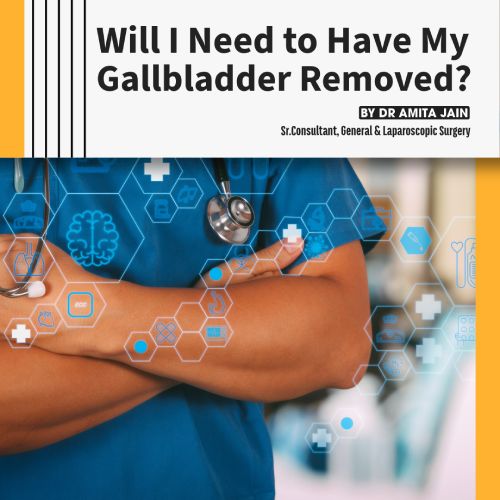The gallbladder, a small organ located beneath the liver, plays a crucial role in the digestive system by storing and releasing bile to aid in the digestion of fats. However, various factors such as gallstones, inflammation, or other gallbladder disorders can lead to discomfort and potential complications.
One common question that arises in such situations is whether one will need to have their gallbladder removed. Let’s get to know from this blog from India’s leading laparoscopic gallbladder surgeon Dr Amita Jain who explains the factors influencing this decision and what individuals can expect when facing gallbladder-related issues.
Understanding Gallbladder Issues:
Gallstones, solid particles that form in the gallbladder, are a prevalent concern affecting the normal functioning of this organ. While small gallstones may not cause noticeable symptoms, larger stones or clusters can lead to blockages, causing pain, nausea, and other digestive issues. Gallbladder inflammation, known as cholecystitis, is another condition that may require medical attention.
What are the types of diagnosis and evaluation?
If you’re experiencing persistent abdominal pain, nausea, or other symptoms indicative of gallbladder issues, it’s essential to consult a healthcare professional. Diagnosing gallbladder problems typically involves a combination of a medical history review, physical examination, and diagnostic tests such as ultrasound or a CT scan. These assessments help determine the nature and severity of the condition, guiding healthcare providers in making informed decisions about the most suitable course of action.
Non-Surgical Approaches:
Not all gallbladder issues necessitate surgical intervention. In cases where symptoms are mild or infrequent, non-surgical approaches may be recommended. Lifestyle modifications, dietary changes, and medications can sometimes manage symptoms and prevent the progression of gallbladder problems. This is particularly true for individuals with cholesterol-based gallstones that may respond to dietary adjustments and medications aimed at dissolving the stones.
What about the decision for surgery?
However, when symptoms are severe, recurrent, or associated with complications such as infection or inflammation, surgical removal of the gallbladder, known as cholecystectomy, may be recommended. While the idea of surgery can be daunting, it’s important to recognize that the gallbladder is not an essential organ, and individuals can live a healthy life without it.
Benefits of Cholecystectomy:
Cholecystectomy can offer significant relief from the symptoms associated with gallbladder issues. By removing the gallbladder, the source of the problem is eliminated, reducing the likelihood of recurrent pain, digestive discomfort, and other complications. The surgery is commonly performed using minimally invasive techniques, such as laparoscopy, which involves smaller incisions and shorter recovery times compared to traditional open surgery.
Recovery and Post-Surgery Care:
Recovery from cholecystectomy is generally well-tolerated, and most individuals can resume their normal activities within a short period. Post-surgery care may involve dietary adjustments, particularly in the initial weeks, to help the body adapt to the absence of the gallbladder. While some individuals may experience changes in bowel habits, these are usually temporary, and the majority of people adapt well to life without a gallbladder.
The decision to have your gallbladder removed depends on the severity of your symptoms, the nature of your gallbladder condition, and the recommendations of your healthcare provider. While surgery may be the best option for some, others may find relief through non-surgical approaches. It’s crucial to communicate openly with your healthcare team, ask questions, and actively participate in the decision-making process to ensure the most suitable and personalized care plan for your specific situation. Ultimately, advances in medical technology and a better understanding of gallbladder health provide individuals with effective options for managing and treating gallbladder issues, contributing to improved overall well-being.

Dr Amita Jain is one of India’s most distinguished and experienced senior surgeons who has conducted more than 1,00,000 successful surgeries, and has covered a wide spectrum of general and minimally invasive procedures. Dr Amita Jain is refered as the pioneer surgeon in the fields of Gallbladder stone removal surgery, appendix removal surgery, hernia repair surgery, Pilonidal Sinus treatments, varicose vein and piles surgery, fistula surgery and fissure surgeries.
With an outstanding career spanning over 29 years, Dr Amita Jain has earned her place among the top General and Laparoscopic surgeons in Delhi and India, known for her precision, compassion, and consistent surgical excellence. She was the Professor of Surgery at the Army College of Medical Sciences and Base Hospital, Delhi Cantt. In 1994, she was commissioned as a surgeon under the United Nations Mission in Congo.
Dr Amita Jain currently serves as the Head of Department and Senior Consultant for General, Laparoscopic and Trauma Surgery at Artemis Lite Hospital, Rosewalk – Luxury Maternity Hospital in Delhi (Panchsheel Park, Delhi) and Rainbow Children Hospitals (Malviya Nagar, Delhi).
